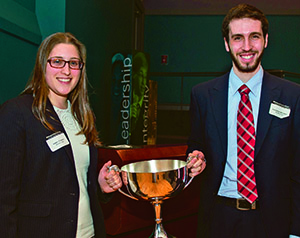St. Louis is becoming widely recognized as a hub for entrepreneurship. Students at Washington University in St. Louis are taking advantage of the close proximity to great resources by starting their own business ventures, with the help of a variety of on-campus clubs, competitions and a groundbreaking class.

The Hatchery, offered by Olin Business School but open to all students, both undergraduate and graduate, is one of the university’s capstone entrepreneurship courses.
It was one of the first business courses in the country to use multidisciplinary team collaboration, mentoring and coaching to support students as they launch enterprises while in college.
Enrolled students can work on their own social or commercial venture ideas or partner with community entrepreneurs to develop theirs.
“The Hatchery is fortunate to have the support of the St. Louis entrepreneurship community for the benefit of the students,” says Clifford Holekamp, senior lecturer in entrepreneurship and one of the course teachers.
“Students are connected with business consultants, subject matter experts and industry leaders to help develop their plans, and a judging panel of entrepreneurs and early-stage investors help evaluate the final results.”
The course is proving quite successful.
“Typically, more than 50 percent of student-initiated ideas are actually launched, an unusually high statistic that speaks to how extraordinarily entrepreneurial Washington University students are,” Holekamp says.
“The course is great because it is structured in a way that provides you with enough guidance that you don’t feel like you’re completely on your own, but enough freedom that you truly learn through experience,” says sophomore Arts & Sciences student Jolijt Tamanaha.
Tamanaha and a team of fellow undergraduates founded Farmplicity, which provides a path for local farm producers to sell fresh goods directly to St. Louis restaurants.
“Ken Harrington (managing director of the university’s Skandalaris Center for Entrepreneurial Studies and course instructor has put us in contact with so many amazing people, including many chefs and restaurateurs in St. Louis, who helped us flush out our concept,” Tamanaha says.
“At Washington University, our main goal is to have students experience the uncertainty that surrounds entrepreneurial activity,” Harrington says. “The Hatchery is one of several capstone courses where they learn to take action and have impact. Once this happens, they become ‘entrepreneurial’ for life.”
“I think the Hatchery is a fantastic course for those interested in entrepreneurship,” says senior Andrew Brimer, studying mechanical engineering in the School of Engineering and Applied Science.
Brimer and Abby Cohen, a senior majoring in biomedical engineering, used the Hatchery to help hone their business, Sparo Labs. Their award-winning team, which includes students from Olin Business School, is developing a low-cost spirometer, a device that measures lung function. While most of these devices cost between $1,000 and $2,000, Sparo Labs is developing a model that will cost around $8.
“The course forces you to understand all the facets of a business venture and you never stop learning,” Brimer says. “The university is doing a great job promoting and encouraging entrepreneurship on all levels, from the ‘back of a napkin ideas’ that can be pitched at an IdeaBounce, to the Olin Cup or Discovery Competition that help foster more developed or mature projects into real companies with serious funding.”
“The Hatchery really helped us find mentors,” says senior Farmplicity team member Lauren Ortwein, majoring in marketing and operations and supply chain management at Olin Business School. “When you have a whole organization like the Skandarlaris Center helping connect you with local entrepreneurs, opportunity after opportunity presents itself to you when you put in the hard work.”